Impact of Organizational Culture on Knowledge Management: A Report
VerifiedAdded on 2021/06/17
|7
|2390
|70
Report
AI Summary
This report delves into the critical relationship between organizational culture and knowledge management. It begins by defining knowledge management and outlining its core processes, including the identification, collection, storage, and sharing of information. The report then explores how organizational culture, encompassing beliefs, values, and norms, plays a dual role—both weakening and strengthening—knowledge management initiatives. It highlights the importance of a culture that fosters cooperation, trust, and learning. Furthermore, the report examines integrative models such as the CVF and SECI models, demonstrating how they can be combined to enhance our understanding of knowledge creation, conversion, and managerial leadership. The study concludes by emphasizing the need for a robust organizational culture to facilitate effective knowledge management, stressing the importance of applying knowledge to practical needs and fostering a learning environment. This report offers a comprehensive analysis of the cultural factors that influence the success of knowledge management systems within organizations, providing valuable insights for managers and leaders.
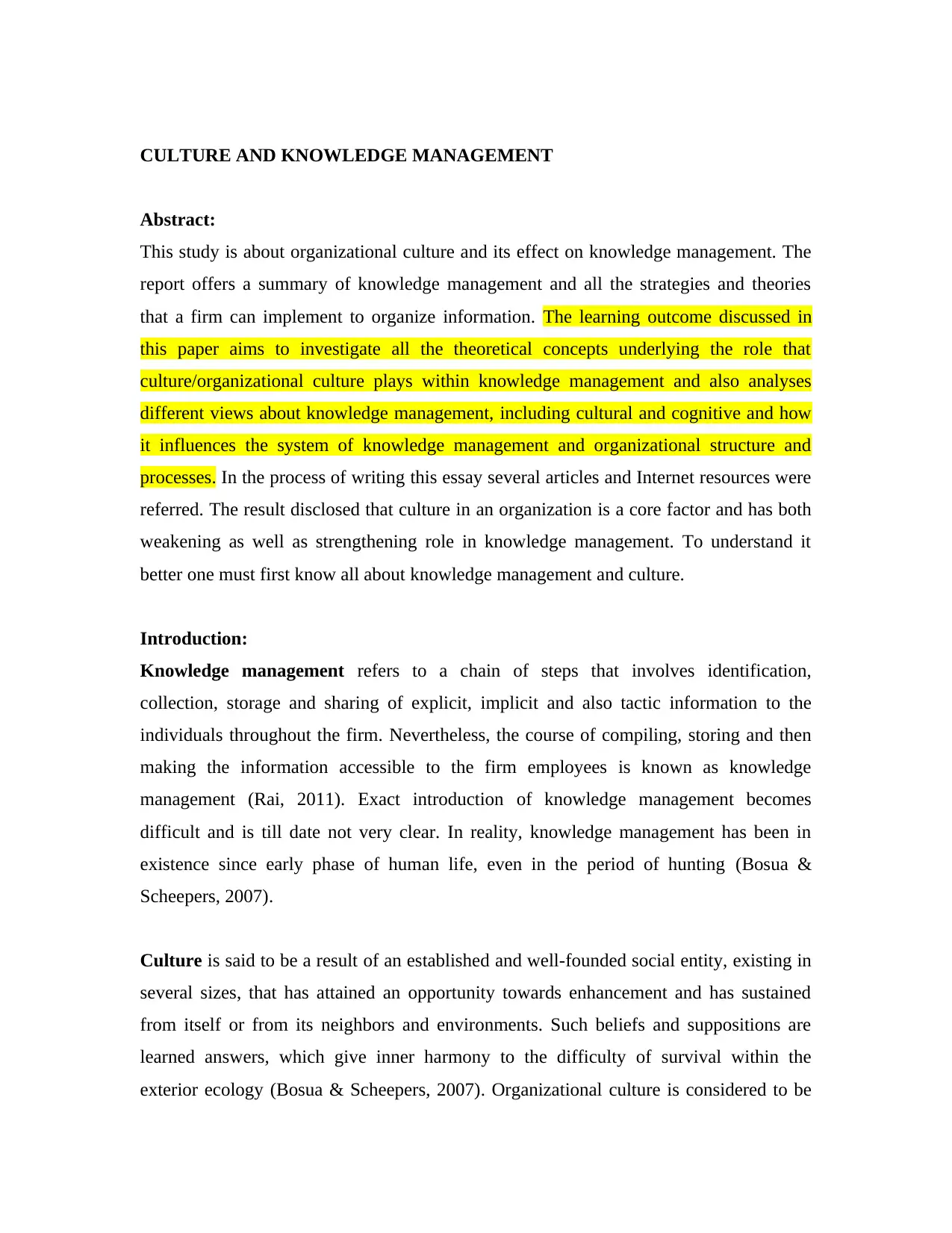
CULTURE AND KNOWLEDGE MANAGEMENT
Abstract:
This study is about organizational culture and its effect on knowledge management. The
report offers a summary of knowledge management and all the strategies and theories
that a firm can implement to organize information. The learning outcome discussed in
this paper aims to investigate all the theoretical concepts underlying the role that
culture/organizational culture plays within knowledge management and also analyses
different views about knowledge management, including cultural and cognitive and how
it influences the system of knowledge management and organizational structure and
processes. In the process of writing this essay several articles and Internet resources were
referred. The result disclosed that culture in an organization is a core factor and has both
weakening as well as strengthening role in knowledge management. To understand it
better one must first know all about knowledge management and culture.
Introduction:
Knowledge management refers to a chain of steps that involves identification,
collection, storage and sharing of explicit, implicit and also tactic information to the
individuals throughout the firm. Nevertheless, the course of compiling, storing and then
making the information accessible to the firm employees is known as knowledge
management (Rai, 2011). Exact introduction of knowledge management becomes
difficult and is till date not very clear. In reality, knowledge management has been in
existence since early phase of human life, even in the period of hunting (Bosua &
Scheepers, 2007).
Culture is said to be a result of an established and well-founded social entity, existing in
several sizes, that has attained an opportunity towards enhancement and has sustained
from itself or from its neighbors and environments. Such beliefs and suppositions are
learned answers, which give inner harmony to the difficulty of survival within the
exterior ecology (Bosua & Scheepers, 2007). Organizational culture is considered to be
Abstract:
This study is about organizational culture and its effect on knowledge management. The
report offers a summary of knowledge management and all the strategies and theories
that a firm can implement to organize information. The learning outcome discussed in
this paper aims to investigate all the theoretical concepts underlying the role that
culture/organizational culture plays within knowledge management and also analyses
different views about knowledge management, including cultural and cognitive and how
it influences the system of knowledge management and organizational structure and
processes. In the process of writing this essay several articles and Internet resources were
referred. The result disclosed that culture in an organization is a core factor and has both
weakening as well as strengthening role in knowledge management. To understand it
better one must first know all about knowledge management and culture.
Introduction:
Knowledge management refers to a chain of steps that involves identification,
collection, storage and sharing of explicit, implicit and also tactic information to the
individuals throughout the firm. Nevertheless, the course of compiling, storing and then
making the information accessible to the firm employees is known as knowledge
management (Rai, 2011). Exact introduction of knowledge management becomes
difficult and is till date not very clear. In reality, knowledge management has been in
existence since early phase of human life, even in the period of hunting (Bosua &
Scheepers, 2007).
Culture is said to be a result of an established and well-founded social entity, existing in
several sizes, that has attained an opportunity towards enhancement and has sustained
from itself or from its neighbors and environments. Such beliefs and suppositions are
learned answers, which give inner harmony to the difficulty of survival within the
exterior ecology (Bosua & Scheepers, 2007). Organizational culture is considered to be
Paraphrase This Document
Need a fresh take? Get an instant paraphrase of this document with our AI Paraphraser
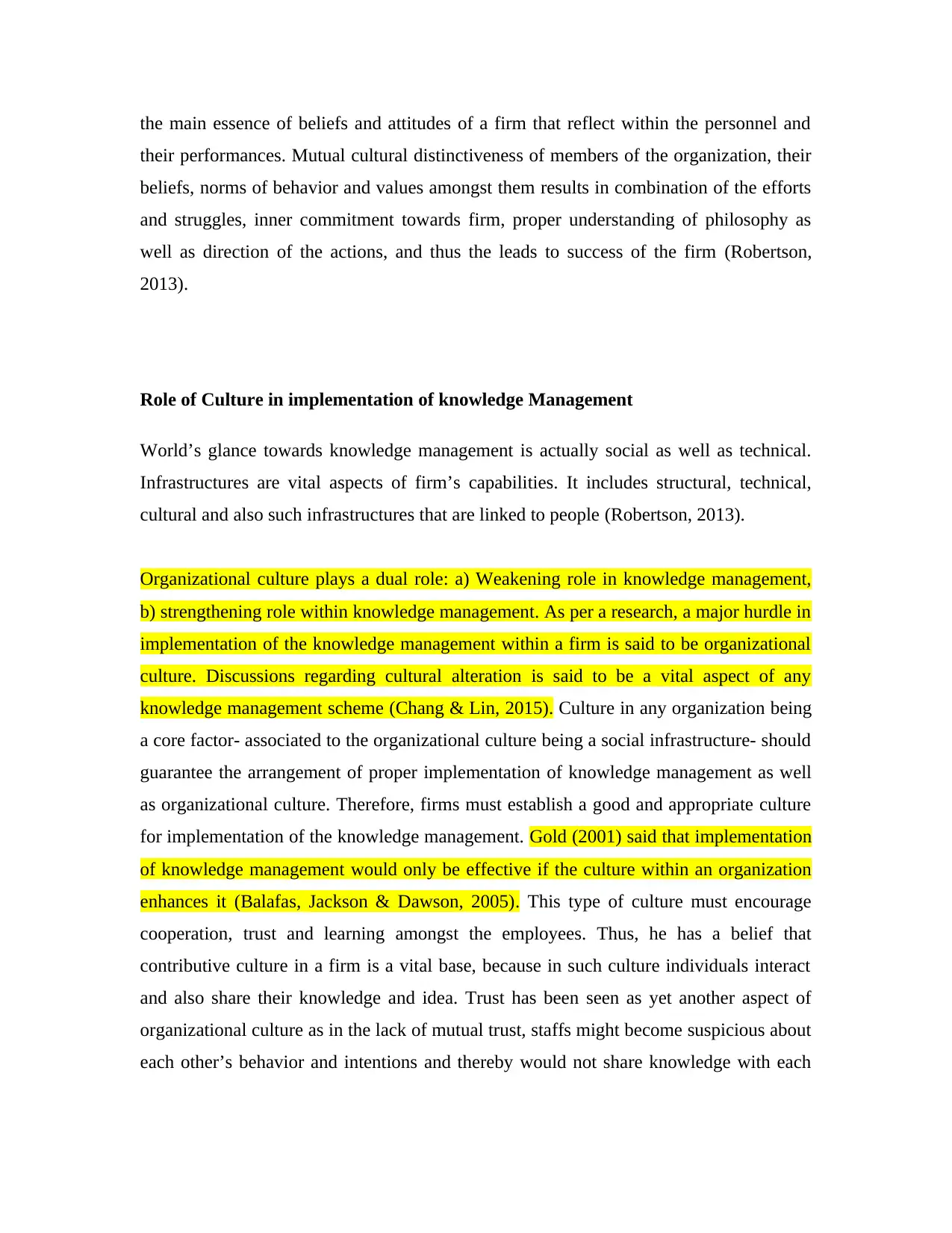
the main essence of beliefs and attitudes of a firm that reflect within the personnel and
their performances. Mutual cultural distinctiveness of members of the organization, their
beliefs, norms of behavior and values amongst them results in combination of the efforts
and struggles, inner commitment towards firm, proper understanding of philosophy as
well as direction of the actions, and thus the leads to success of the firm (Robertson,
2013).
Role of Culture in implementation of knowledge Management
World’s glance towards knowledge management is actually social as well as technical.
Infrastructures are vital aspects of firm’s capabilities. It includes structural, technical,
cultural and also such infrastructures that are linked to people (Robertson, 2013).
Organizational culture plays a dual role: a) Weakening role in knowledge management,
b) strengthening role within knowledge management. As per a research, a major hurdle in
implementation of the knowledge management within a firm is said to be organizational
culture. Discussions regarding cultural alteration is said to be a vital aspect of any
knowledge management scheme (Chang & Lin, 2015). Culture in any organization being
a core factor- associated to the organizational culture being a social infrastructure- should
guarantee the arrangement of proper implementation of knowledge management as well
as organizational culture. Therefore, firms must establish a good and appropriate culture
for implementation of the knowledge management. Gold (2001) said that implementation
of knowledge management would only be effective if the culture within an organization
enhances it (Balafas, Jackson & Dawson, 2005). This type of culture must encourage
cooperation, trust and learning amongst the employees. Thus, he has a belief that
contributive culture in a firm is a vital base, because in such culture individuals interact
and also share their knowledge and idea. Trust has been seen as yet another aspect of
organizational culture as in the lack of mutual trust, staffs might become suspicious about
each other’s behavior and intentions and thereby would not share knowledge with each
their performances. Mutual cultural distinctiveness of members of the organization, their
beliefs, norms of behavior and values amongst them results in combination of the efforts
and struggles, inner commitment towards firm, proper understanding of philosophy as
well as direction of the actions, and thus the leads to success of the firm (Robertson,
2013).
Role of Culture in implementation of knowledge Management
World’s glance towards knowledge management is actually social as well as technical.
Infrastructures are vital aspects of firm’s capabilities. It includes structural, technical,
cultural and also such infrastructures that are linked to people (Robertson, 2013).
Organizational culture plays a dual role: a) Weakening role in knowledge management,
b) strengthening role within knowledge management. As per a research, a major hurdle in
implementation of the knowledge management within a firm is said to be organizational
culture. Discussions regarding cultural alteration is said to be a vital aspect of any
knowledge management scheme (Chang & Lin, 2015). Culture in any organization being
a core factor- associated to the organizational culture being a social infrastructure- should
guarantee the arrangement of proper implementation of knowledge management as well
as organizational culture. Therefore, firms must establish a good and appropriate culture
for implementation of the knowledge management. Gold (2001) said that implementation
of knowledge management would only be effective if the culture within an organization
enhances it (Balafas, Jackson & Dawson, 2005). This type of culture must encourage
cooperation, trust and learning amongst the employees. Thus, he has a belief that
contributive culture in a firm is a vital base, because in such culture individuals interact
and also share their knowledge and idea. Trust has been seen as yet another aspect of
organizational culture as in the lack of mutual trust, staffs might become suspicious about
each other’s behavior and intentions and thereby would not share knowledge with each
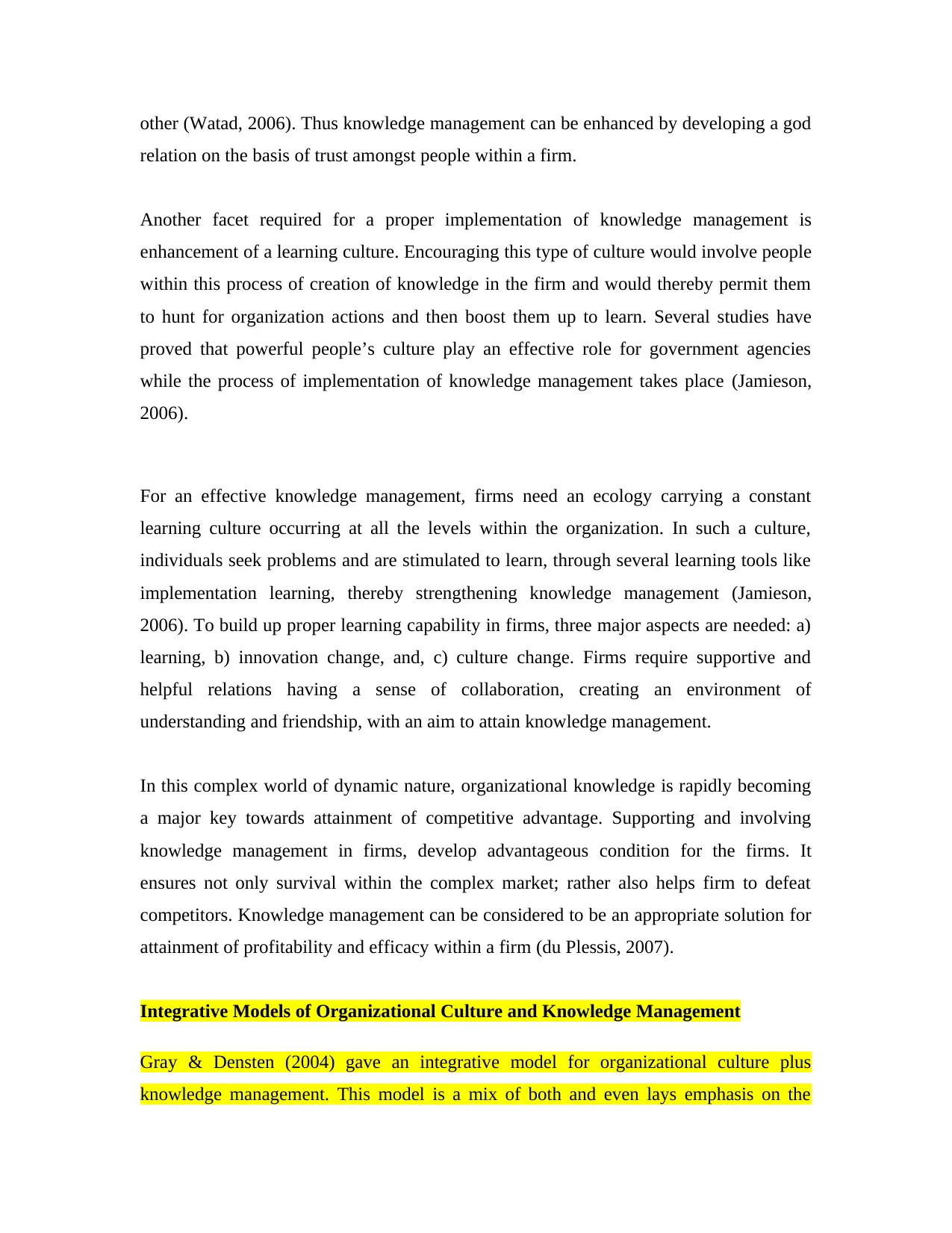
other (Watad, 2006). Thus knowledge management can be enhanced by developing a god
relation on the basis of trust amongst people within a firm.
Another facet required for a proper implementation of knowledge management is
enhancement of a learning culture. Encouraging this type of culture would involve people
within this process of creation of knowledge in the firm and would thereby permit them
to hunt for organization actions and then boost them up to learn. Several studies have
proved that powerful people’s culture play an effective role for government agencies
while the process of implementation of knowledge management takes place (Jamieson,
2006).
For an effective knowledge management, firms need an ecology carrying a constant
learning culture occurring at all the levels within the organization. In such a culture,
individuals seek problems and are stimulated to learn, through several learning tools like
implementation learning, thereby strengthening knowledge management (Jamieson,
2006). To build up proper learning capability in firms, three major aspects are needed: a)
learning, b) innovation change, and, c) culture change. Firms require supportive and
helpful relations having a sense of collaboration, creating an environment of
understanding and friendship, with an aim to attain knowledge management.
In this complex world of dynamic nature, organizational knowledge is rapidly becoming
a major key towards attainment of competitive advantage. Supporting and involving
knowledge management in firms, develop advantageous condition for the firms. It
ensures not only survival within the complex market; rather also helps firm to defeat
competitors. Knowledge management can be considered to be an appropriate solution for
attainment of profitability and efficacy within a firm (du Plessis, 2007).
Integrative Models of Organizational Culture and Knowledge Management
Gray & Densten (2004) gave an integrative model for organizational culture plus
knowledge management. This model is a mix of both and even lays emphasis on the
relation on the basis of trust amongst people within a firm.
Another facet required for a proper implementation of knowledge management is
enhancement of a learning culture. Encouraging this type of culture would involve people
within this process of creation of knowledge in the firm and would thereby permit them
to hunt for organization actions and then boost them up to learn. Several studies have
proved that powerful people’s culture play an effective role for government agencies
while the process of implementation of knowledge management takes place (Jamieson,
2006).
For an effective knowledge management, firms need an ecology carrying a constant
learning culture occurring at all the levels within the organization. In such a culture,
individuals seek problems and are stimulated to learn, through several learning tools like
implementation learning, thereby strengthening knowledge management (Jamieson,
2006). To build up proper learning capability in firms, three major aspects are needed: a)
learning, b) innovation change, and, c) culture change. Firms require supportive and
helpful relations having a sense of collaboration, creating an environment of
understanding and friendship, with an aim to attain knowledge management.
In this complex world of dynamic nature, organizational knowledge is rapidly becoming
a major key towards attainment of competitive advantage. Supporting and involving
knowledge management in firms, develop advantageous condition for the firms. It
ensures not only survival within the complex market; rather also helps firm to defeat
competitors. Knowledge management can be considered to be an appropriate solution for
attainment of profitability and efficacy within a firm (du Plessis, 2007).
Integrative Models of Organizational Culture and Knowledge Management
Gray & Densten (2004) gave an integrative model for organizational culture plus
knowledge management. This model is a mix of both and even lays emphasis on the
⊘ This is a preview!⊘
Do you want full access?
Subscribe today to unlock all pages.

Trusted by 1+ million students worldwide
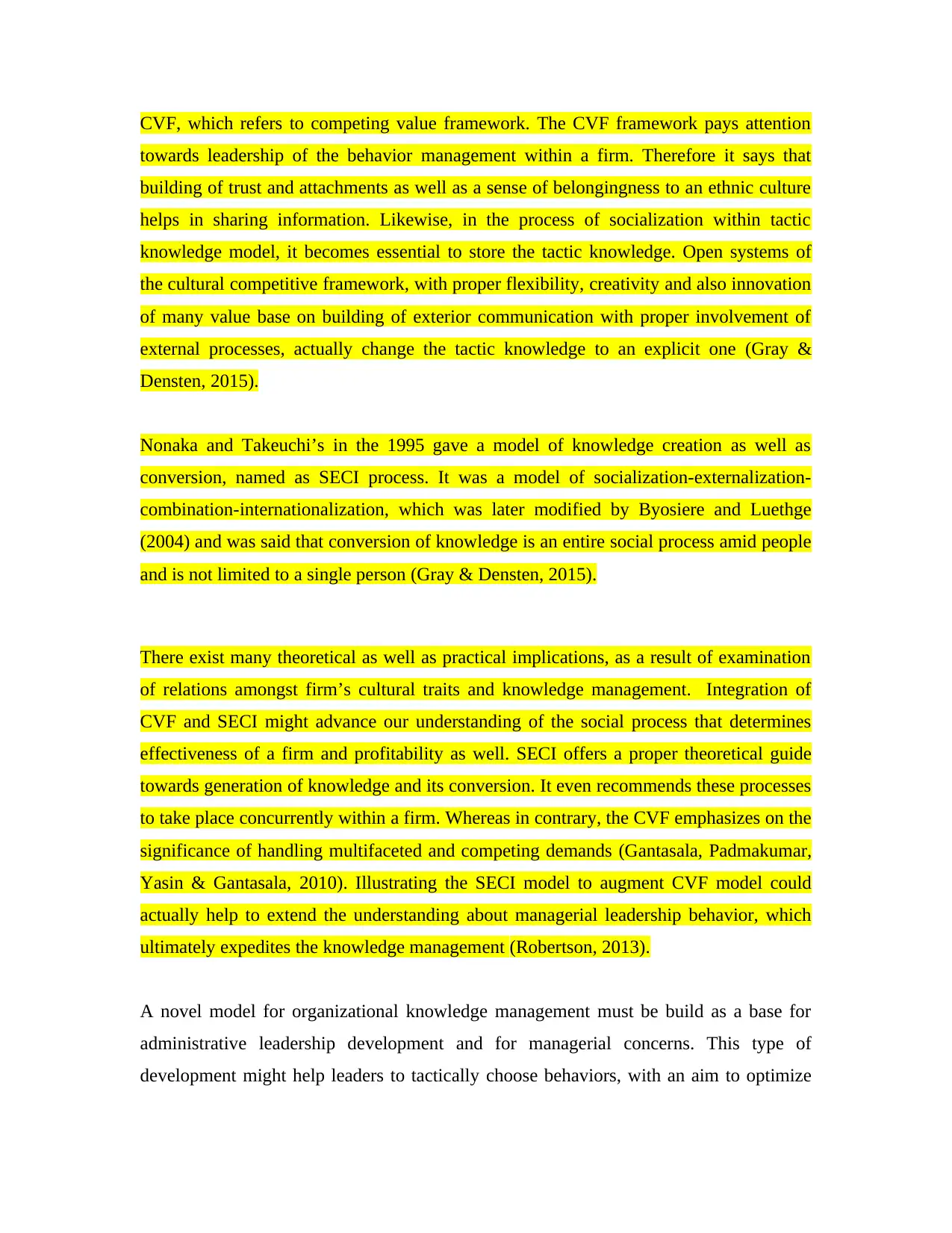
CVF, which refers to competing value framework. The CVF framework pays attention
towards leadership of the behavior management within a firm. Therefore it says that
building of trust and attachments as well as a sense of belongingness to an ethnic culture
helps in sharing information. Likewise, in the process of socialization within tactic
knowledge model, it becomes essential to store the tactic knowledge. Open systems of
the cultural competitive framework, with proper flexibility, creativity and also innovation
of many value base on building of exterior communication with proper involvement of
external processes, actually change the tactic knowledge to an explicit one (Gray &
Densten, 2015).
Nonaka and Takeuchi’s in the 1995 gave a model of knowledge creation as well as
conversion, named as SECI process. It was a model of socialization-externalization-
combination-internationalization, which was later modified by Byosiere and Luethge
(2004) and was said that conversion of knowledge is an entire social process amid people
and is not limited to a single person (Gray & Densten, 2015).
There exist many theoretical as well as practical implications, as a result of examination
of relations amongst firm’s cultural traits and knowledge management. Integration of
CVF and SECI might advance our understanding of the social process that determines
effectiveness of a firm and profitability as well. SECI offers a proper theoretical guide
towards generation of knowledge and its conversion. It even recommends these processes
to take place concurrently within a firm. Whereas in contrary, the CVF emphasizes on the
significance of handling multifaceted and competing demands (Gantasala, Padmakumar,
Yasin & Gantasala, 2010). Illustrating the SECI model to augment CVF model could
actually help to extend the understanding about managerial leadership behavior, which
ultimately expedites the knowledge management (Robertson, 2013).
A novel model for organizational knowledge management must be build as a base for
administrative leadership development and for managerial concerns. This type of
development might help leaders to tactically choose behaviors, with an aim to optimize
towards leadership of the behavior management within a firm. Therefore it says that
building of trust and attachments as well as a sense of belongingness to an ethnic culture
helps in sharing information. Likewise, in the process of socialization within tactic
knowledge model, it becomes essential to store the tactic knowledge. Open systems of
the cultural competitive framework, with proper flexibility, creativity and also innovation
of many value base on building of exterior communication with proper involvement of
external processes, actually change the tactic knowledge to an explicit one (Gray &
Densten, 2015).
Nonaka and Takeuchi’s in the 1995 gave a model of knowledge creation as well as
conversion, named as SECI process. It was a model of socialization-externalization-
combination-internationalization, which was later modified by Byosiere and Luethge
(2004) and was said that conversion of knowledge is an entire social process amid people
and is not limited to a single person (Gray & Densten, 2015).
There exist many theoretical as well as practical implications, as a result of examination
of relations amongst firm’s cultural traits and knowledge management. Integration of
CVF and SECI might advance our understanding of the social process that determines
effectiveness of a firm and profitability as well. SECI offers a proper theoretical guide
towards generation of knowledge and its conversion. It even recommends these processes
to take place concurrently within a firm. Whereas in contrary, the CVF emphasizes on the
significance of handling multifaceted and competing demands (Gantasala, Padmakumar,
Yasin & Gantasala, 2010). Illustrating the SECI model to augment CVF model could
actually help to extend the understanding about managerial leadership behavior, which
ultimately expedites the knowledge management (Robertson, 2013).
A novel model for organizational knowledge management must be build as a base for
administrative leadership development and for managerial concerns. This type of
development might help leaders to tactically choose behaviors, with an aim to optimize
Paraphrase This Document
Need a fresh take? Get an instant paraphrase of this document with our AI Paraphraser
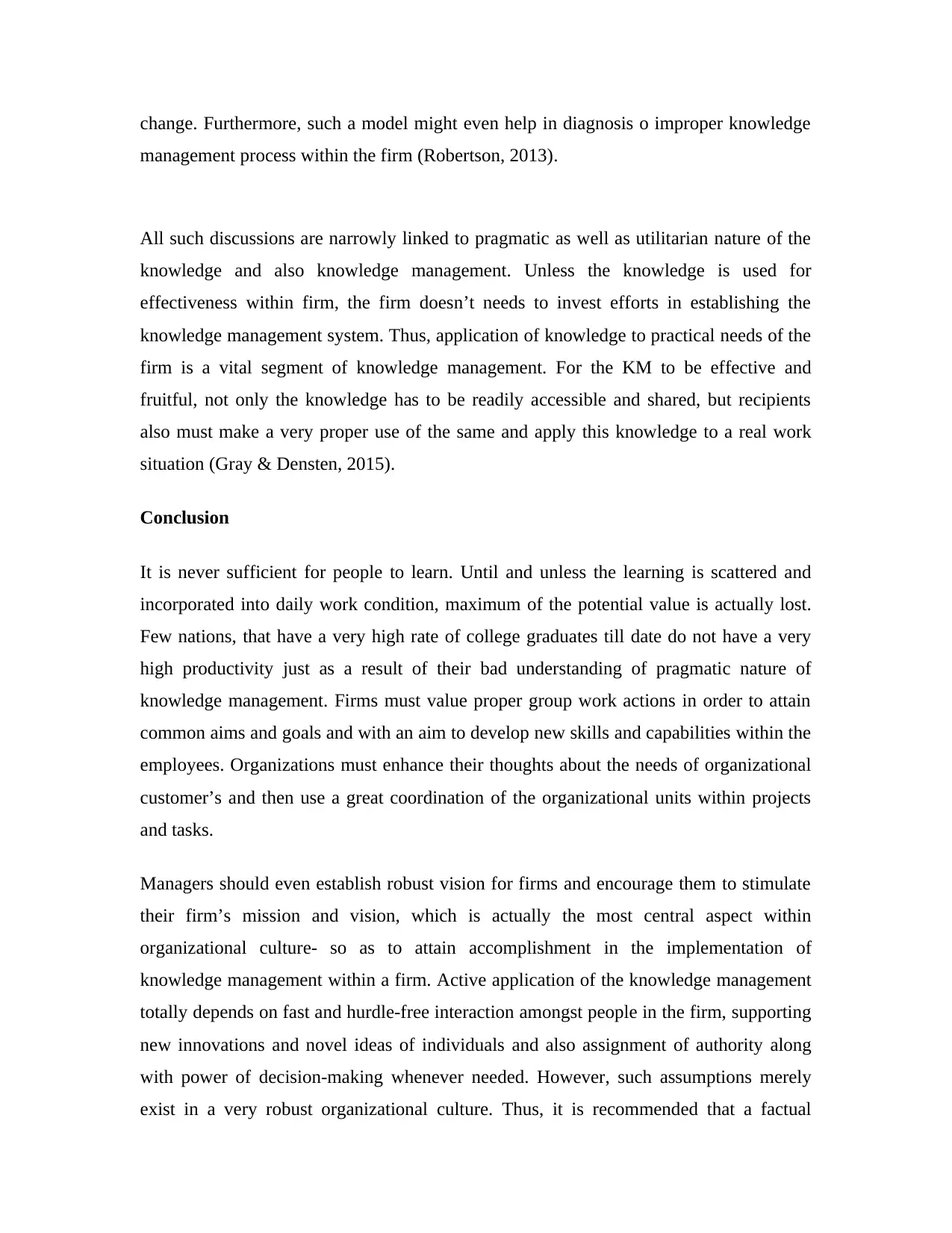
change. Furthermore, such a model might even help in diagnosis o improper knowledge
management process within the firm (Robertson, 2013).
All such discussions are narrowly linked to pragmatic as well as utilitarian nature of the
knowledge and also knowledge management. Unless the knowledge is used for
effectiveness within firm, the firm doesn’t needs to invest efforts in establishing the
knowledge management system. Thus, application of knowledge to practical needs of the
firm is a vital segment of knowledge management. For the KM to be effective and
fruitful, not only the knowledge has to be readily accessible and shared, but recipients
also must make a very proper use of the same and apply this knowledge to a real work
situation (Gray & Densten, 2015).
Conclusion
It is never sufficient for people to learn. Until and unless the learning is scattered and
incorporated into daily work condition, maximum of the potential value is actually lost.
Few nations, that have a very high rate of college graduates till date do not have a very
high productivity just as a result of their bad understanding of pragmatic nature of
knowledge management. Firms must value proper group work actions in order to attain
common aims and goals and with an aim to develop new skills and capabilities within the
employees. Organizations must enhance their thoughts about the needs of organizational
customer’s and then use a great coordination of the organizational units within projects
and tasks.
Managers should even establish robust vision for firms and encourage them to stimulate
their firm’s mission and vision, which is actually the most central aspect within
organizational culture- so as to attain accomplishment in the implementation of
knowledge management within a firm. Active application of the knowledge management
totally depends on fast and hurdle-free interaction amongst people in the firm, supporting
new innovations and novel ideas of individuals and also assignment of authority along
with power of decision-making whenever needed. However, such assumptions merely
exist in a very robust organizational culture. Thus, it is recommended that a factual
management process within the firm (Robertson, 2013).
All such discussions are narrowly linked to pragmatic as well as utilitarian nature of the
knowledge and also knowledge management. Unless the knowledge is used for
effectiveness within firm, the firm doesn’t needs to invest efforts in establishing the
knowledge management system. Thus, application of knowledge to practical needs of the
firm is a vital segment of knowledge management. For the KM to be effective and
fruitful, not only the knowledge has to be readily accessible and shared, but recipients
also must make a very proper use of the same and apply this knowledge to a real work
situation (Gray & Densten, 2015).
Conclusion
It is never sufficient for people to learn. Until and unless the learning is scattered and
incorporated into daily work condition, maximum of the potential value is actually lost.
Few nations, that have a very high rate of college graduates till date do not have a very
high productivity just as a result of their bad understanding of pragmatic nature of
knowledge management. Firms must value proper group work actions in order to attain
common aims and goals and with an aim to develop new skills and capabilities within the
employees. Organizations must enhance their thoughts about the needs of organizational
customer’s and then use a great coordination of the organizational units within projects
and tasks.
Managers should even establish robust vision for firms and encourage them to stimulate
their firm’s mission and vision, which is actually the most central aspect within
organizational culture- so as to attain accomplishment in the implementation of
knowledge management within a firm. Active application of the knowledge management
totally depends on fast and hurdle-free interaction amongst people in the firm, supporting
new innovations and novel ideas of individuals and also assignment of authority along
with power of decision-making whenever needed. However, such assumptions merely
exist in a very robust organizational culture. Thus, it is recommended that a factual
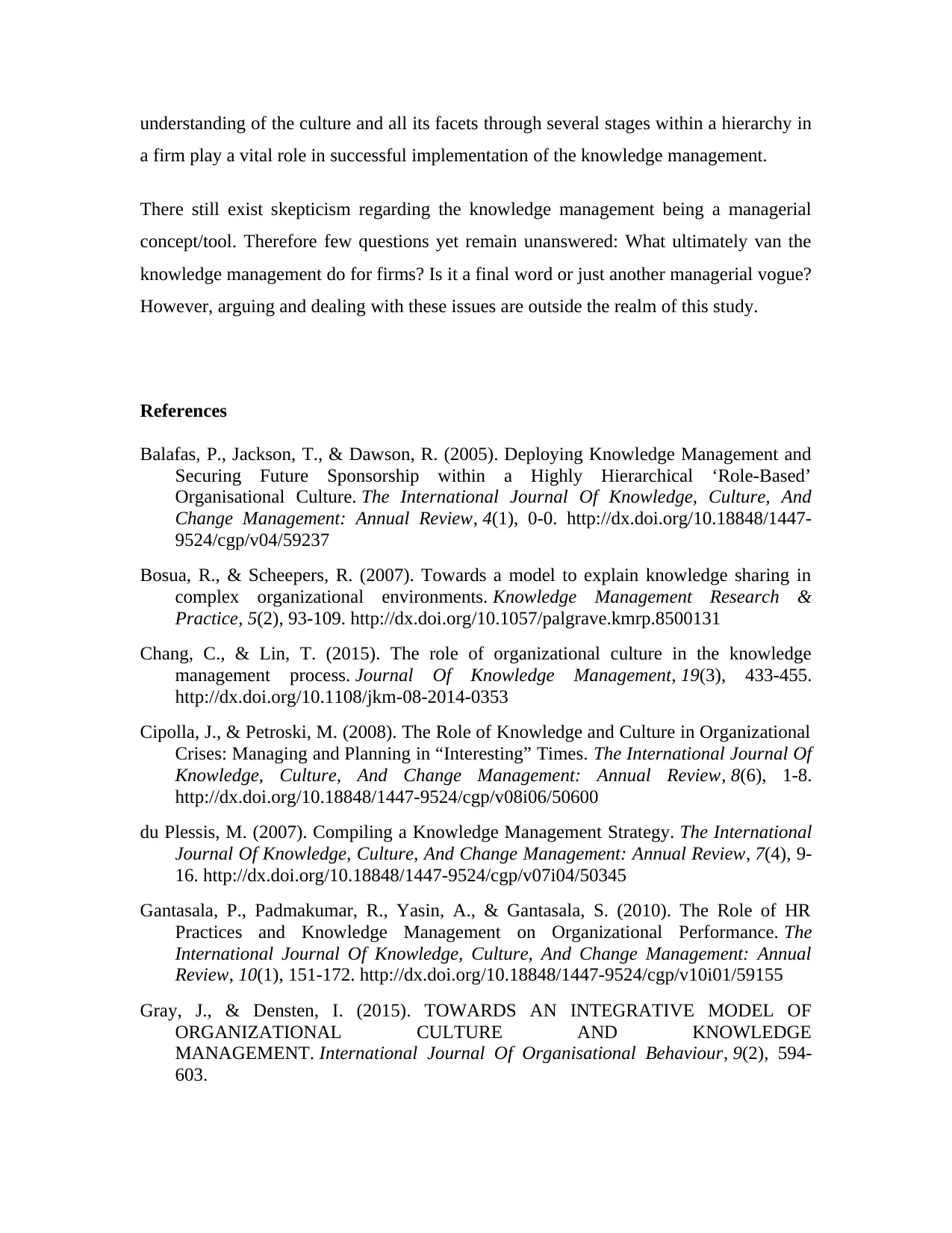
understanding of the culture and all its facets through several stages within a hierarchy in
a firm play a vital role in successful implementation of the knowledge management.
There still exist skepticism regarding the knowledge management being a managerial
concept/tool. Therefore few questions yet remain unanswered: What ultimately van the
knowledge management do for firms? Is it a final word or just another managerial vogue?
However, arguing and dealing with these issues are outside the realm of this study.
References
Balafas, P., Jackson, T., & Dawson, R. (2005). Deploying Knowledge Management and
Securing Future Sponsorship within a Highly Hierarchical ‘Role-Based’
Organisational Culture. The International Journal Of Knowledge, Culture, And
Change Management: Annual Review, 4(1), 0-0. http://dx.doi.org/10.18848/1447-
9524/cgp/v04/59237
Bosua, R., & Scheepers, R. (2007). Towards a model to explain knowledge sharing in
complex organizational environments. Knowledge Management Research &
Practice, 5(2), 93-109. http://dx.doi.org/10.1057/palgrave.kmrp.8500131
Chang, C., & Lin, T. (2015). The role of organizational culture in the knowledge
management process. Journal Of Knowledge Management, 19(3), 433-455.
http://dx.doi.org/10.1108/jkm-08-2014-0353
Cipolla, J., & Petroski, M. (2008). The Role of Knowledge and Culture in Organizational
Crises: Managing and Planning in “Interesting” Times. The International Journal Of
Knowledge, Culture, And Change Management: Annual Review, 8(6), 1-8.
http://dx.doi.org/10.18848/1447-9524/cgp/v08i06/50600
du Plessis, M. (2007). Compiling a Knowledge Management Strategy. The International
Journal Of Knowledge, Culture, And Change Management: Annual Review, 7(4), 9-
16. http://dx.doi.org/10.18848/1447-9524/cgp/v07i04/50345
Gantasala, P., Padmakumar, R., Yasin, A., & Gantasala, S. (2010). The Role of HR
Practices and Knowledge Management on Organizational Performance. The
International Journal Of Knowledge, Culture, And Change Management: Annual
Review, 10(1), 151-172. http://dx.doi.org/10.18848/1447-9524/cgp/v10i01/59155
Gray, J., & Densten, I. (2015). TOWARDS AN INTEGRATIVE MODEL OF
ORGANIZATIONAL CULTURE AND KNOWLEDGE
MANAGEMENT. International Journal Of Organisational Behaviour, 9(2), 594-
603.
a firm play a vital role in successful implementation of the knowledge management.
There still exist skepticism regarding the knowledge management being a managerial
concept/tool. Therefore few questions yet remain unanswered: What ultimately van the
knowledge management do for firms? Is it a final word or just another managerial vogue?
However, arguing and dealing with these issues are outside the realm of this study.
References
Balafas, P., Jackson, T., & Dawson, R. (2005). Deploying Knowledge Management and
Securing Future Sponsorship within a Highly Hierarchical ‘Role-Based’
Organisational Culture. The International Journal Of Knowledge, Culture, And
Change Management: Annual Review, 4(1), 0-0. http://dx.doi.org/10.18848/1447-
9524/cgp/v04/59237
Bosua, R., & Scheepers, R. (2007). Towards a model to explain knowledge sharing in
complex organizational environments. Knowledge Management Research &
Practice, 5(2), 93-109. http://dx.doi.org/10.1057/palgrave.kmrp.8500131
Chang, C., & Lin, T. (2015). The role of organizational culture in the knowledge
management process. Journal Of Knowledge Management, 19(3), 433-455.
http://dx.doi.org/10.1108/jkm-08-2014-0353
Cipolla, J., & Petroski, M. (2008). The Role of Knowledge and Culture in Organizational
Crises: Managing and Planning in “Interesting” Times. The International Journal Of
Knowledge, Culture, And Change Management: Annual Review, 8(6), 1-8.
http://dx.doi.org/10.18848/1447-9524/cgp/v08i06/50600
du Plessis, M. (2007). Compiling a Knowledge Management Strategy. The International
Journal Of Knowledge, Culture, And Change Management: Annual Review, 7(4), 9-
16. http://dx.doi.org/10.18848/1447-9524/cgp/v07i04/50345
Gantasala, P., Padmakumar, R., Yasin, A., & Gantasala, S. (2010). The Role of HR
Practices and Knowledge Management on Organizational Performance. The
International Journal Of Knowledge, Culture, And Change Management: Annual
Review, 10(1), 151-172. http://dx.doi.org/10.18848/1447-9524/cgp/v10i01/59155
Gray, J., & Densten, I. (2015). TOWARDS AN INTEGRATIVE MODEL OF
ORGANIZATIONAL CULTURE AND KNOWLEDGE
MANAGEMENT. International Journal Of Organisational Behaviour, 9(2), 594-
603.
⊘ This is a preview!⊘
Do you want full access?
Subscribe today to unlock all pages.

Trusted by 1+ million students worldwide
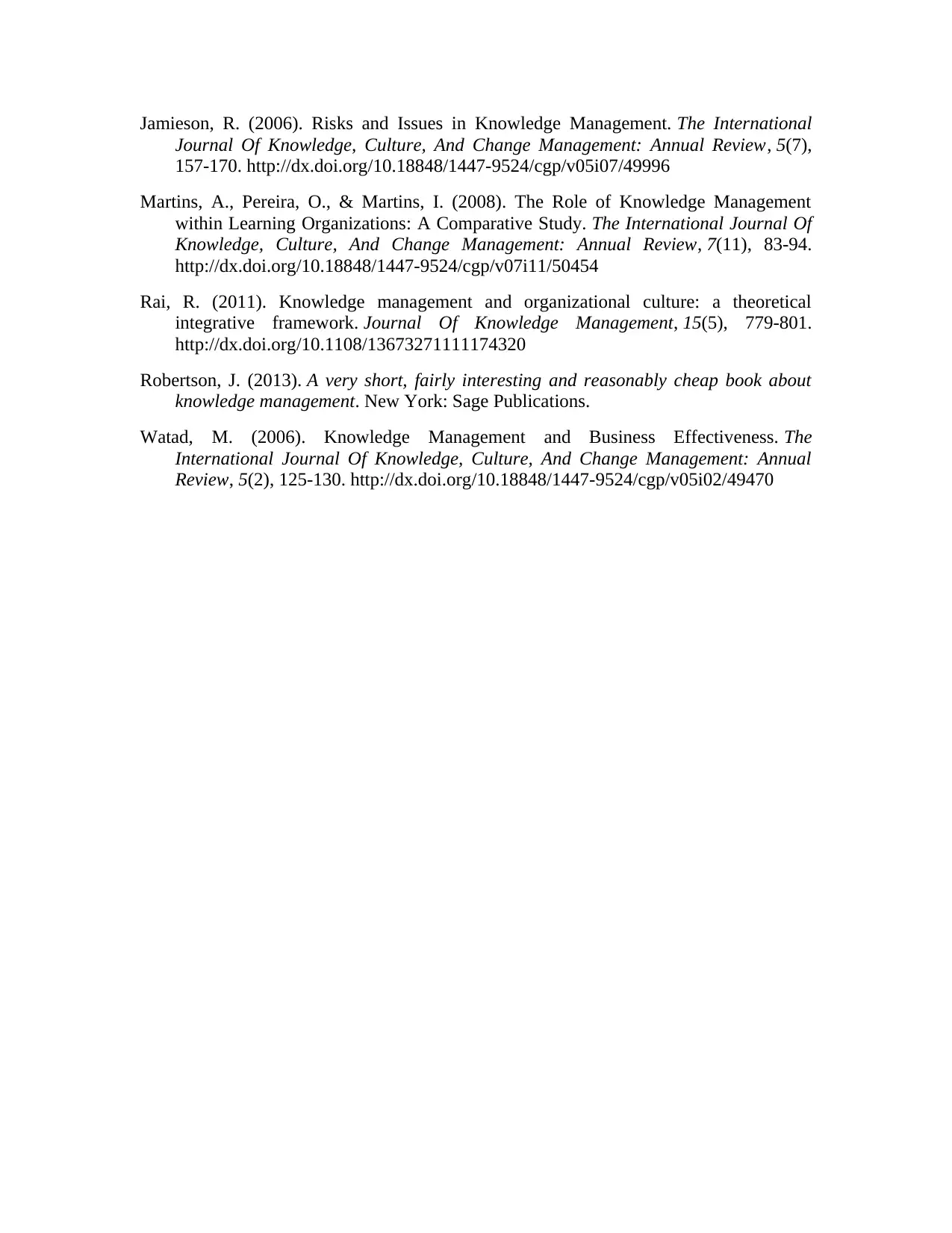
Jamieson, R. (2006). Risks and Issues in Knowledge Management. The International
Journal Of Knowledge, Culture, And Change Management: Annual Review, 5(7),
157-170. http://dx.doi.org/10.18848/1447-9524/cgp/v05i07/49996
Martins, A., Pereira, O., & Martins, I. (2008). The Role of Knowledge Management
within Learning Organizations: A Comparative Study. The International Journal Of
Knowledge, Culture, And Change Management: Annual Review, 7(11), 83-94.
http://dx.doi.org/10.18848/1447-9524/cgp/v07i11/50454
Rai, R. (2011). Knowledge management and organizational culture: a theoretical
integrative framework. Journal Of Knowledge Management, 15(5), 779-801.
http://dx.doi.org/10.1108/13673271111174320
Robertson, J. (2013). A very short, fairly interesting and reasonably cheap book about
knowledge management. New York: Sage Publications.
Watad, M. (2006). Knowledge Management and Business Effectiveness. The
International Journal Of Knowledge, Culture, And Change Management: Annual
Review, 5(2), 125-130. http://dx.doi.org/10.18848/1447-9524/cgp/v05i02/49470
Journal Of Knowledge, Culture, And Change Management: Annual Review, 5(7),
157-170. http://dx.doi.org/10.18848/1447-9524/cgp/v05i07/49996
Martins, A., Pereira, O., & Martins, I. (2008). The Role of Knowledge Management
within Learning Organizations: A Comparative Study. The International Journal Of
Knowledge, Culture, And Change Management: Annual Review, 7(11), 83-94.
http://dx.doi.org/10.18848/1447-9524/cgp/v07i11/50454
Rai, R. (2011). Knowledge management and organizational culture: a theoretical
integrative framework. Journal Of Knowledge Management, 15(5), 779-801.
http://dx.doi.org/10.1108/13673271111174320
Robertson, J. (2013). A very short, fairly interesting and reasonably cheap book about
knowledge management. New York: Sage Publications.
Watad, M. (2006). Knowledge Management and Business Effectiveness. The
International Journal Of Knowledge, Culture, And Change Management: Annual
Review, 5(2), 125-130. http://dx.doi.org/10.18848/1447-9524/cgp/v05i02/49470
1 out of 7
Related Documents
Your All-in-One AI-Powered Toolkit for Academic Success.
+13062052269
info@desklib.com
Available 24*7 on WhatsApp / Email
![[object Object]](/_next/static/media/star-bottom.7253800d.svg)
Unlock your academic potential
Copyright © 2020–2026 A2Z Services. All Rights Reserved. Developed and managed by ZUCOL.




